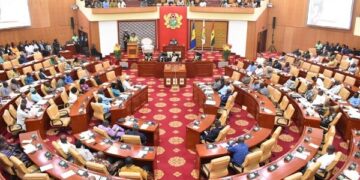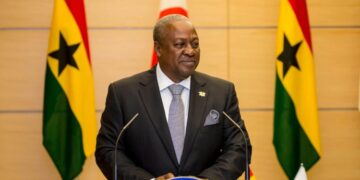Market players have been urged to consider working on their pricing schemes to enable buyers patronize goods and services at an affordable rate to restore confidence in the economy.
Real GDP Growth in Ghana has softened in 2022, as soaring inflation, tighter monetary policy and a depreciating currency have dampened private sector confidence, as well as prices of food and services spiralling.
It is in this light that members of parliament’s trade committee urged them to explore ways of stabilizing the prices of goods and services.
Speaking with journalists on Tuesday after an engagement with officials of the Ghana Union of Traders Association (GUTA) and Association of Ghana Industries (AGI), the Ministry of Trade and Industry and the Ghana Chamber of Commerce, the Chairman of Parliament’s Trade and Industry Committee, Carlos Ahenkorah said, “Is an engagement of all people in the trade and manufacturing sector to see how we can fashion a solution to what is happening in Ghana, we have heard from our constituents and how people are complaining about food prices and the general economy. You could see these were aggrieved and wanted to vent their spleen.
We have heard them, they have enumerated a lot of problems they are facing, they proffered solutions and we are going to put it together in a composite document and arrive at a position paper and present it to the government through parliament to see how we can meet them halfway.
On their side, we have asked them to see how they can make people of Ghana feel relieved by trying to stabilize prices on the market for a little bit longer and see how they can affect the lives of people and ensuring they are not pressurizing people with what they sell and how they sell them.”
The issue of profiteering, and hoarding came up but the market players refuted such assertions on their part.
The President of GUTA, Dr Joseph Obeng stated that the meeting was “long overdue and that for the betterment of the country it was in line to sit at a round table to proffer solutions to the crisis that we find ourselves in.”
He added that regarding some policies that may not go their favour, he insisted that for the betterment of the country, they have to let go. “We are thinking about diversifying trade, amendment of investment laws that should debar excessive influx of foreigners in the trading space to derail the efforts of manufacturing and to destroy local initiatives.”
The President of Association of Ghana Industries (AGI), Dr.Humphrey Ayim-Darke on his part welcomed the engagement but emphasized that it should be properly structured periodically.
He also indicated that there should be wider consultation in policy formulated which he thinks will inure to the benefit of all stakeholders. “We need to go beyond policy formulation and see a clear plan from parliamentarians that represents us, NDPC, Ministry of Finance and the Executive, we should focus on the national collective good , not any document that the party manifesto is based on.
Fiscal pressures have remained high. Over the first half of 2022, the fiscal deficit reached 5.6 percent of GDP, well above the 3.9 percent target for the same period.
Revenues underperformed, as the flagship e-levy was introduced late and faced major implementation challenges. As of end-June 2022, public debt reached 78.3 percent of GDP and interest payments reached 54.4 percent of revenues over the first half of the year.





















































































